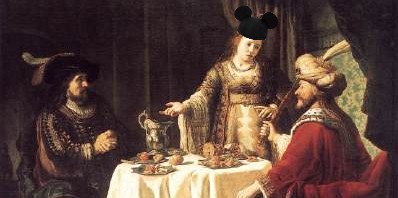Today, the church celebrates the feast of three young men, Shadrack, Mesach and Abednego, the companions of Daniel the prophet: they are important for highlighting a much neglected group in the church – the transgendered.
We are probably all familiar with the stories of Daniel in the lion’s den, and of his three companions in the burning fiery furnace. What they don’t tell us in Sunday School, is that as slaves captured and taken to service in the king’s court in Babylon they were almost certainly eunuchs – castrated males. This was the standard fate of slaves in the royal court, as Kathryn Ringrose has shown, and as anticipated by Isaiah:
And some of your descendants, your own flesh and blood who will be born to you, will be taken away, and they will become eunuchs in the palace of the king of Babylon.
-Isaiah 39:7
If there is any group more likely to have the bible-pumping conservatives frothing at the mouth more than gay and lesbian Christians, perhaps it is the trans community. Yet this is entirely misplaced, as Isaiah makes clear elsewhere:
4For this is what the LORD says:
“To the eunuchs who keep my Sabbaths,
who choose what pleases me
and hold fast to my covenant—
5 to them I will give within my temple and its walls
a memorial and a name
better than sons and daughters;
I will give them an everlasting name
that will endure forever.
-Isaiah 56: 4- 5
The three young men, forcibly castrated as slaves, are clearly not directly comparable to the modern trans community, but there are nevertheless lessons to be learnt, from them and from others in Christian (and non-Christian) history. In the Gospel of Matthew, we read
But he said to them, “Not everyone can receive this saying, but only those to whom it is given. For there are eunuchs who have been so from birth, and there are eunuchs who have been made eunuchs by men, and there are eunuchs who have made themselves eunuchs for the sake of the kingdom of heaven. Let the one who is able to receive this receive it.”
The Babylonian slaves were clearly among those who have been made so by others. Those who made themselves so for the sake of the kingdom of heaven may be a reference to the common religious practice in the societies surrounding the Jews of men who castrated themselves to serve as priests, especially in the cult of Cybele , and also in some other religions. (Some commentators believe that is this practice of castration that is meant by the words mistranslated in some of the clobber texts as “homosexuals”, lines which more accurately refer to castrated gentile priests. In this view, it is the association with pagan idolatry, not the sexual practices themselves, which made them taboo). The idea of making oneself a eunuch for the kingdom of God later led some early Christians to adopt the practice, notably the early theologian Origen, who castrated himself in. Metaphorically, it is the same idea of emasculation which underlies the Catholic church’s insistence on compulsory celibacy for priests in the Roman rite.
Modern trans people are also not directly comparable to this third group – but they are arguably included in the first group: made so by birth. Less directly, some scholars argue that the biblical term “eunuch” is the closest parallel in biblical language to the modern term “homosexual”, and so the welcome promised by Isaiah may be said to apply to all who are queer in church –
a memorial and a name
better than sons and daughters;
I will give them an everlasting name
that will endure forever
Even if we reject this connection, there remains a fundamentally important lesson for us all in the story of the three young men, a story that has relevance and resonance for us today that goes way beyond the children’s illustrated Bible pictures of men who could not be burned by the flames. To see this, remember why it is that they are commemorated. They were commanded by the king to eat the forbidden meat – to conform. It was for their refusal to knuckle under and give in to the pressure to abandon their fundamental religious identity that they were sentenced to death by burning.
But in their faith and loyalty, they were protected from the flames. Centuries later, it was the Christian Church that again turned to burning as a punishment for those who refused to conform, either to orthodox religious belief, or to heteronormative sexual standards. We continue to live with the legacy of that prejudice, which masquerades as religious obligation. Like the three men in the Babylonian fire, we too must stand firm in our commitment to the truth. In our steadfastness, the flames of prejudice and religious bigotry will likewise be unable to destroy our queer Christian community.
(The image used is a window by John Piper as a memorial to Benjamin Britten, whose “Burning Fiery Furnace” told the story of the three young men as one of his three “parables for church performance” – one act operas, although Britten himself avoided the term).
Related articles











